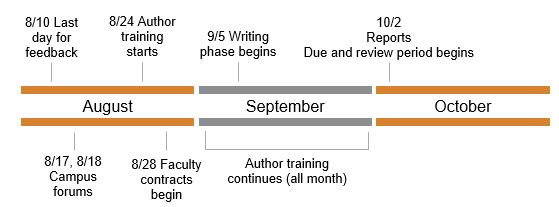August 16, 2017
To the Campus Community;
The APASP Task Force has been busy finalizing the process as we barrel toward the start of fall semester. This update focuses on three topics: timeline and communication, author training, and some responses to specific online feedback we received.
Timeline and Communication
Last week the APASP Task Force finalized the Criteria & Metrics, Prioritization Categories, and Rubrics & Weights to be used in the process. This week, the Task Force expects to finalize the Process framework and lists of Units of Analysis. We anticipate that all aspects of the APASP process will be final and posted to the APASP website by 2 p.m. on Thursday, August 17.
The APASP Task Force is holding two campus forums in the UC Theatre (they will also be live-streamed on MCAT) in which we will share lessons learned from the pilot and subsequent revisions to the process with the campus community:
- from 3-4 p.m. on Thursday, August 17 and
- from 11 a.m. – noon on Friday, August 18.
We have updated our website as we move from designing the process and integrating campus feedback to training report authors and preparing them to compose their unit reports. The timeline for fall authorship and review is below:

Author Training
Three different types of author training will be offered starting Thursday, August 24. Separate author training will be held for Academic Programs and Administrative Services. Training offered will include:
- Orientation Sessions: These sessions orient authors to APASP criteria and metrics. Participants will leave with an understanding of the process and a walk-through of the criteria.
- Author Workshops: These workshops offer a guided opportunity to share ideas, receive peer feedback, and work on your report writing. Bring your draft report, and note specific sections on which you would like peer readers’ feedback.
- Report Polishing Session: Held one week prior to the deadline, these sessions offer an opportunity to have colleagues from other departments provide feedback on your report content and approach.
All author training dates, times, and locations are posted on the APASP website.
Feedback received from the campus community
Many academic programs pointed out that it is nearly impossible to divide faculty FTE between programs when most departments share faculty between various programs. This is true for quite a few metrics in the criteria. For this reason, some metrics will be marked as “Departmental Data” while others will apply specifically to programs. For example, the number of majors will be counted at the program level. The number of tenured/tenure-track faculty as well as a count of all instructional faculty will be tracked at the departmental level. Programs will be able to address this in their comments on the central data and Task Force members will be aware of this when reviewing the reports.
There have also been numerous questions regarding faculty who are given release time for administrative work such as chair/director/program head duties or advising. These faculty will still be included in the counts. While they might not be teaching, the release time is an indication that their work is vital to the functions of the program and ultimately the cost of a program. There is great disparity across campus for how such release time is allocated and therefore all faculty will be counted toward both the count of tenured/tenure-track faculty as well as all instructional faculty (including non-tenurable faculty and TAs).
We greatly appreciate the high level of engagement with the Task Force from the campus community this summer. Thank you for your careful review of drafts of process materials, and for validating and commenting on centrally-generated data. We especially thank those who participated in our pilot author training and review. As we conclude the development phase of the APASP process and move on to authorship and review, it is important to acknowledge that that the time for the Task Force to implement feedback on the prioritization process has come to an end. However, we want to emphasize that we will continue to welcome insights from the campus community via our online feedback form. While the feedback we receive will not impact our process this year, it will be considered as UM identifies components of the prioritization process that can be incorporated into future systematic review processes.
Sincerely,
John Kenneth DeBoer, Associate Professor
Head of Performance & Practice
School of Theatre & Dance